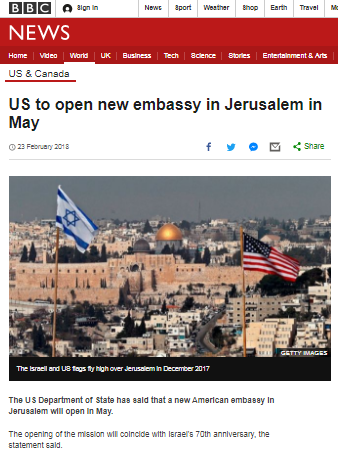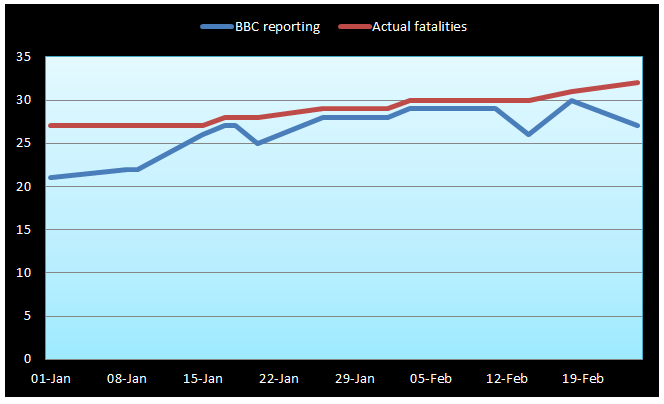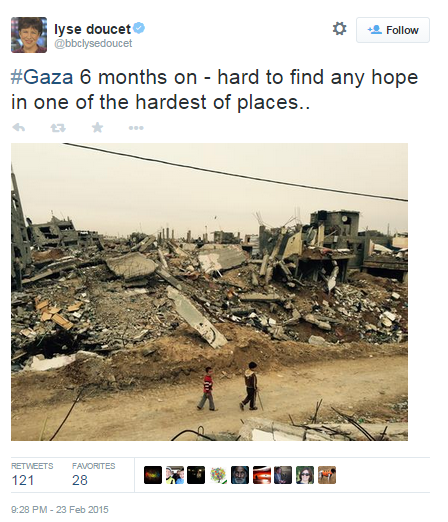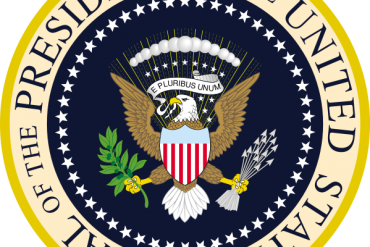The US State Department’s February 23rd announcement concerning the opening of an interim embassy in Jerusalem this coming May was the topic of an article published on the BBC News website’s Middle East page that same evening under the headline “US to open new embassy in Jerusalem in May“.
The two initial versions of the article inaccurately suggested to BBC audiences that Tel Aviv could be seen as the capital of Israel.
“Donald Trump said in December that the US would recognise Jerusalem – not Tel Aviv – as Israel’s capital, infuriating Palestinians.”
And:
“Donald Trump’s decision last year that the US would recognise Jerusalem – not Tel Aviv – as Israel’s capital infuriated Palestinians.”
In the final version of the report – amended the following day – that statement was replaced by the following:
“Donald Trump’s decision in December to recognise Jerusalem as Israel’s capital and move the embassy from Tel Aviv, where all other embassies are located, infuriated Palestinians.
The declaration broke with decades of US neutrality on the issue and put it out of step with the rest of the international community.”
In fact, the US Congress of course voted to recognise Jerusalem as Israel’s capital over two decades ago.
Readers were told that:
“Within days of President Trump’s declaration, a UN resolution was passed declaring any decisions regarding the status of the city “null and void” and insisting on its cancellation. It was backed by 128 states, with 35 abstaining and nine voting against.”
They were not however informed that the UN GA resolution concerned is non-binding.
Readers of this report were not told that the site chosen for the new US embassy in Israel is in a neighbourhood of Jerusalem that remained under Israeli control under the terms of the 1949 Armistice Agreement.
“The US Department of State spokeswoman said the embassy would initially be located at existing consular facilities in the Arnona district of the city.”
As has been the case ever since it began covering this story in late 2016, the BBC not only did not question Palestinian objections to the relocation of the US embassy to an area of Jerusalem to which the BBC repeatedly tells its audiences – including in this article – the PA does not lay claim, but provided them with uncritical amplification.
“A senior Palestinian official, Saeb Erekat, called the move a “blatant provocation”. […]
Mr Erekat said the US move “reflects their total insensitivities to what goes on in this region”.
It “reaffirms our position that the US can no longer be part of the peace process,” he added. “The US administration has become part of the problem and not part of the solution.””
Readers also found a context-free portrayal of passive Palestinians displaced in 1948 that made no mention of the fact that the war concerned was instigated by Arab leaders who, in many cases, ordered them to leave their homes.
“The US Department of State has said that a new American embassy in Jerusalem will open in May.
The opening of the mission will coincide with Israel’s 70th anniversary, the statement said. […]
The anniversary of Israel’s founding precedes by a day what Palestinians call the Nakba, or “catastrophe” of their displacement in the 1948-49 Arab-Israel war. […]
Last month, US Vice-President Mike Pence told the Israeli parliament that the move would occur sometime before the end of 2019.
The sudden change to this May has been seen by some as a deliberate snub to Palestinians.”
Notably – although unsurprisingly – that latter unattributed BBC claim is entirely in step with Palestinian statements on the issue.




